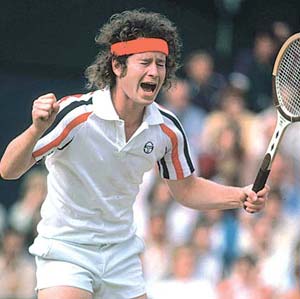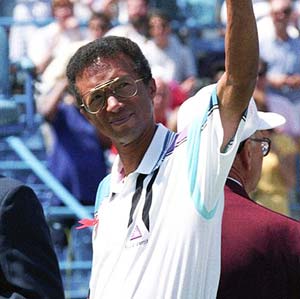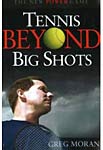| TennisOne Lessons It's Tough to Hit the Ball with Your Hands Around Your Throat Greg Moran Be it a social doubles game, a league match or a pro final, whenever the score is being kept, the opportunity to “choke” is always there. When I played competitively as a junior, I tended to get extremely nervous and, as a result, frequently choked away matches. My greatest “choke” happened over 30 years ago, but I remember like it was yesterday, and it still stings.
It was early December and I was in the quarterfinals of a big junior tournament. I was pumped up because it was my first time in the final eight. I felt confident I could win my next match and advance to the semi-finals. "The semis," I thought at the time, "that's where real players are. Maybe I’m one of them!" With a few days before the match, I had time for a couple of practice sessions. I drilled, played sets and worked out on the ball machine. I used the machine primarily for one shot, my shoulder-high backhand volley. It was a weak shot for me, and I wanted to get comfortable hitting it before the match. I must have hit 2,000 shoulder-high backhand volleys and got to the point where I could execute the shot consistently. I was ready. Three days, and two sets later, John and I stood at 6-6 in the deciding set. Back then we played 9-point tiebreakers, which meant that the first player to win five points would take the match and, a trip to the semifinals. As I stepped to the line to serve the first point, my eyes shifted to the side of the court where I saw my girlfriend, coach and parents all pumping their fists in encouragement. I could also see my heart beating through my shirt and feel my palms beginning to drip with sweat. With each successive point, my legs and racquet grew heavier, my heart pounded faster and my grip became wetter and wetter. To say the least, I was tense. Fortunately, John was as well, so after 8 points (all of which ended in unforced errors) the score was 4-4. The next point would decide who went to the semis and who went home. After a long rally, a cross-court forehand moved John off the court and I sprinted to the net. John then presented me with an early Christmas present — a shoulder-high floater to, you guessed it, my backhand side. The exact shot I’d practiced all week long. I closed in, just like I had done countless times in practice, squeezed my grip a bit tighter and promptly volleyed the ball deep into the corner... of the next court. I choked, big time.
As I came off the court, my coach wisely gave me a few minutes to cool off and reclaim my racquets from the courtside garbage can. He then sat me down and made me talk about what was going through my mind during that third set tiebreaker when I was, so clearly, a nervous wreck. As much as I tried to avoid the truth, Stan was clever and had an answer for every lame excuse I produced. Finally, I screamed, “I was afraid.” It was fear that caused my heart to virtually rip through my shirt and it was fear that made the sweat from my hands soak my racquet handle. I was afraid and, as that shoulder-high, easy sitter, floated across the net, that fear crippled me. Anyone that has ever stepped onto a tennis court has felt the fear and it can stem from many things: we're afraid to lose. We're afraid of looking bad in front of our friends. We're afraid of letting our parents down. We're afraid we won't make the team. Often, we're even afraid to win, because if we win we may be expected to win again, and who needs that pressure? The list is endless but the fact is that fear has kept many a player from reaching their potential and chased countless others from the game entirely. How then can we battle what is a truly daunting opponent?
The amateur psychologist in me has always felt that people have two sides to their psyche that contribute to their behavior: their thinking side and their feeling side. John McEnroe immediately comes to mind as one whose behavior is frequently dominated by his feelings. I would say that the legendary Arthur Ashe’s behavior came more from his thinking side. McEnroe, readily admits that his intense fear of losing outweighed his love of winning and often fueled his rages. Ashe undoubtedly experienced the same feelings, but his intellectual side was able to suppress his emotional desires to yell out or toss his racquet when things didn't go his way. When we're young we struggle to control our emotions. That's one of the reasons you see a large number of temper tantrums among junior players. The more fragile your self-image is, the more prone you are to choking. Players who tie their self-image to their results on the court tend to choke more because, in their minds, there is a lot more at stake than winning or losing a tennis match.
As we grow up, our intellectual side (hopefully) develops and has more of an influence on our behavior. A well-balanced person still feels the emotions but has learned to control them and resist the urge to scream out or slam that ball into the backstop. Our intellectual side provides us with perspective and it is this perspective that I feel is our best defense against choking. Once we learn to intellectually confront our fears on and off the tennis court, we'll see that in virtually every situation we really have nothing to fear at all. Mark Twain once said, “I have been through some terrible things in my life, some of which actually happened.” After my epic collapse, Stan helped me see that, even though I choked (big time), my life would go on. For most of us, life rarely changes when we lose a tennis match. Our family still loves us, our friends still want to hang out with us, and we will get to play tennis again. Coming to this realization largely freed me from my fear and my tournament results improved dramatically It’s Up To You Still, even the pros choke from time to time. The key is, they’ve developed techniques to minimize it. You can as well. When your heart begins to beat faster and your palms begin to sweat, how will you respond? It’s up to you. The next time you feel the pressure building, here are a few ideas to help keep your heart in your shirt and your grip dry:
Your comments are welcome. Let us know what you think about Greg Moran's article by emailing us here at TennisOne.
Tennis Beyond Big Shots presents a bold back-to-the-future approach. A new game that moves away from power and big shots yet is more lethal to opponents than any booming serve. Greg Moran shows players of all ages and abilities that, with simple and small changes, you can not only maximize your tennis wins and play longer, but also have much more fun doing it. Click link to purchase Greg Moran's book, Tennis Beyond Big Shots. |



